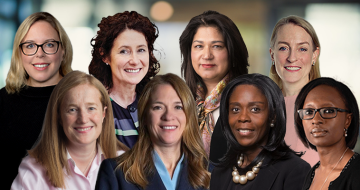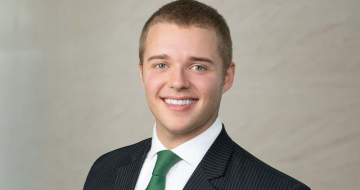Luke Rowland, counsel at Morrison Foerster, talks AI, navigating deals through uncertainty and the fast-evolving role of the modern lawyer

“I’d always thought about law as a possibility, and when the opportunity presented itself to study it academically, I had to take it” recalls Luke Rowland, now M&A of counsel at Morrison Foerster. He began university studying English, but switched to law midway through, completing two years of each and graduating with a qualifying law degree. At first, he considered several paths but found himself drawn to contract and company law. “The prospect of going into the City and working for a corporate firm on transactional matters was really exciting to me at the time,” he says. That interest led him through the usual milk round of law firm events and vacation schemes, eventually training at a leading City firm. After a two year secondment in Hong Kong and a taste of agile, small-team working, with an entrepreneurial side, he began exploring new options — and soon made the move to Morrison Foerster.
Morrison Foerster, like many leading US firms in London, is known for its strategically sized deal teams and hands-on approach and this ethos extends to its junior staff. He explains that the smaller team structure is a real positive for those starting out. “We do staff transactions pretty lean. Partners and senior lawyers are very much in the detail doing legal work. When we are busy, everyone is busy and getting stuck in,” he tells me. In such an environment, junior lawyers quickly find themselves with significant responsibility and exposure. “Even at trainee level you’re a visible, integral part of the deal, working closely with associates and partners rather than being tucked away in the background.”
Our conversation turns to the broader business world that influences M&A work. I ask Rowland about the major global events in recent years that have shaped the deals he works on — both in how transactions are structured and in deal flow. His answer underscores just how turbulent the past decade has been for corporate lawyers. He qualified into practice in 2016, just in time for the Brexit referendum to send shockwaves through the City. “And then there was Brexit, then there was Covid, then there was war in Ukraine, geopolitical instability, higher interest rates, AI, alongside shifting political priorities as governments and regimes change in some of our key markets” he says, reeling off a list of major world events. “Throughout my career you always feel like you’re going through some period of upheaval and change,” he says. “I expect that everyone feels the same way.”
Drilling down, he notes how some of these events specifically affected his practice. Rowland’s focus is on tech-sector M&A, often involving US and international clients. Political uncertainty, for example, had direct consequences — anticipated deal booms were tempered by trade wars and tariffs that left clients skittish at first. “People obviously hadn’t considered tariffs as quite such a risk, so we were a bit slower to start the year than had been predicted,” he explains, though adding that clients quickly adjusted.
It comes as no surprise that the rise of artificial intelligence has been a game-changer in his line of work. The “pace of investment in AI” has surged dramatically. “Tech deals have been big for a decade or more, but the last year has been all about investment in AI and, in particular, AI infrastructure. AI has obviously driven a huge amount of deal making over the last year or so,” Rowland says. “Pretty much every single major transaction I’ve been involved in over the last two years has not just involved AI, but been focused on it,” he adds, calling AI “the key driver for most of my clients” in their investment and acquisition strategy now.
Turning to specifics, one was a deal centred on cutting-edge AI semiconductors while another saw him heavily involved in the acquisition of a UK AI fintech by a large US multinational. The sectors vary, but there’s a common theme. Each target company was “AI-native, built from the ground up” around genuine AI capabilities, rather than a business simply bolting on a bit of “ChatGPT on the side,” as he puts it. Morrison Foerster itself has a strong reputation in tech, and “acting for our clients on these types of investments is our bread and butter,” Rowland says. But he’s quick to add that the appetite for AI assets is “seemingly insatiable” across the industry right now, driving deals at a rapid pace well beyond Morrison Foerster’s own client base.
Given how complex some of these transactions can be, I ask what the role of a lawyer looks like within them. Has the lawyer’s job description changed in the era of tech disruption and demanding clients? Rowland believes it has. Modern M&A lawyers are expected to be more than just document-drafters; they need to be true business advisers. “It’s no longer good enough to just be good at drafting the SPA (sale and purchase agreement) — you have to be good at drafting it in the context of your client, what your client’s business is,” he explains. Knowing the law is only half the game. “When you’re involved in the deal, you have to be advising not just on the legal terms, but also strategically what it means for them and their business,” he continues. Clients nowadays expect their lawyers to anticipate the key issues in a transaction without needing a primer. “If you’re advising on a tech deal, then exposure to AI models or open-source software — those IP issues — are fundamental in a tech deal but irrelevant in a commercial real estate transaction,” he illustrates by way of example. It’s a simple point: a good lawyer should already know what matters in the client’s world. This is exactly what people mean by being a “trusted adviser”.
Rowland emphasises that this business-savvy approach is only becoming more important as clients themselves become more sophisticated. Many of his clients, especially those in the tech sector, handle M&A deals regularly. They are “extremely experienced in M&A — these are no longer occasional events,” he says. As a result, “as clients become more sophisticated, more experienced, obviously the demands on their advisers and their expertise also increase.” In practice, that means a junior lawyer today should be aiming to develop genuine sector knowledge and commercial insight, not just black-letter legal skills. It’s advice he stresses to prospective trainees: law firms want graduates who are keenly interested in how businesses work and can “understand the lay of the land for a client without needing their hand held”.
Finally, we turn to careers advice. As Rowland puts it, now is actually “quite an exciting time to be entering the legal profession,” given how much the industry is changing. We talk about the evolving role of the lawyer and even the emergence of a few “superstar lawyers” — prominent figures who are key advisers to major clients in a way that wasn’t common a generation ago. That heightened status, combined with technological shifts like AI, means the job is more dynamic than ever. “Things like AI will change the way that we practise, but I think only for the better,” he adds.
What matters most for aspiring lawyers is having a “genuine passion for the subject”. “It really helps when practising law to have an academic interest… like a genuine interest in the law and how it works,” Rowland says. That intellectual curiosity will carry you through the challenges of legal practice far better than simply chasing a prestigious career for its own sake. Whether you studied English or engineering, ultimately “I don’t think that is determinative,” he continues. He encourages aspiring solicitors to go into the field because they truly find the law fascinating. “That real interest in the law really does drive people in their careers,” he reflects, noting that many of his university classmates who studied law never actually became lawyers, whereas non-law grads often thrive after converting because they’re coming in motivated by a real enthusiasm for legal work.
Before we wrap up, I ask Rowland for his take on that all-important commercial awareness. How should students go about developing it? He smiles, noting that while reading the news daily is “fine and gives you a baseline,” it only goes so far. “Reading the news is great, but it doesn’t really bring things to life,” he points out. In his view, nothing beats engaging directly with the business world you’re trying to understand. “I would say do exactly what they’re doing now”, he stresses, referring to our upcoming commercial awarness event. Attending insight days and actually talking to lawyers about what issues are affecting their practice is invaluable. “You get a real-life insight into what is actually driving things day-to-day, what clients are actually worried about,” Rowland explains — many nuances can be missed with a simple skim of the headlines. He acknowledges not everyone has the same access but urges students to take any opportunity they can to interact with professionals and ask questions. Ultimately, there’s “really no substitute” for that kind of human interaction. It’s this first-hand exposure that truly “brings it to life,” he says.
Luke Rowland will be speaking at next week’s virtual student event, ‘The Big Commercial Awareness Themes of 2025-26 — with DWF, Goodwin, Irwin Mitchell, Morrison Foerster, TLT and ULaw’ on Monday 10 November. Apply Now.
About Legal Cheek Careers posts.


